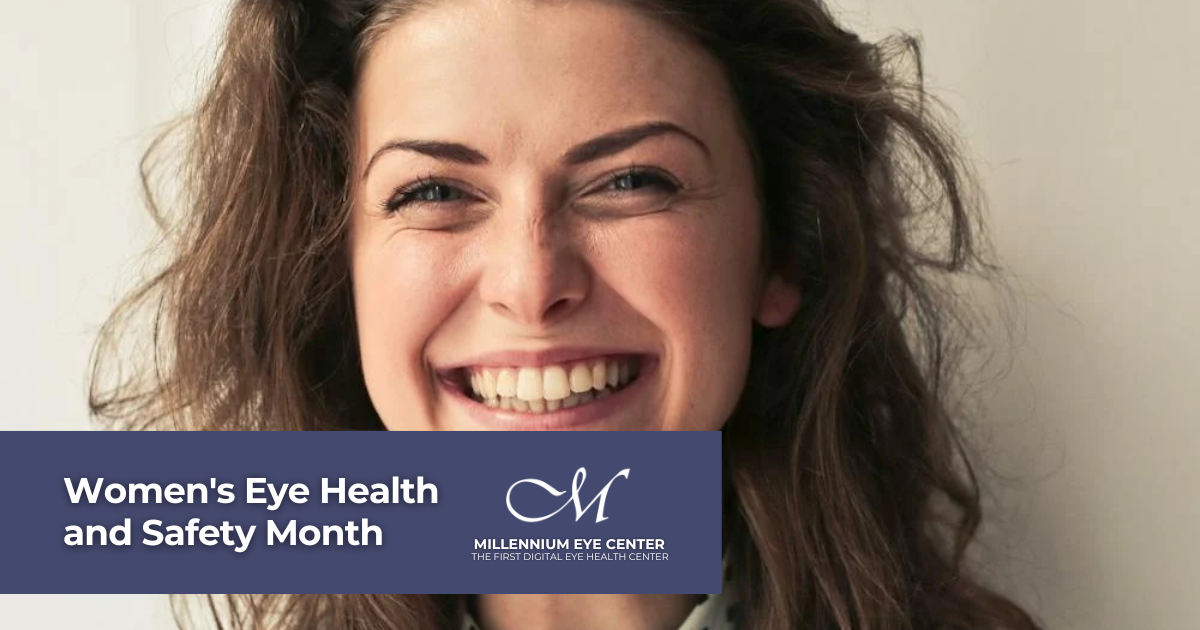Women’s Eye Health and Eye Safety Month spotlights women’s unique visual needs. While everyone benefits from good eye care, women often face specific challenges that require tailored solutions.
At Millennium Eye Center, we believe in integrative eye care, addressing not just the eyes but the whole person. Let’s explore some common eye health issues women experience and discuss preventive measures.
The Importance of Regular Eye Exams for Women
Regular eye exams are crucial for everyone, but they hold particular significance for women.
Hormonal changes, pregnancy, and menopause can all impact vision. Additionally, women have a higher risk of developing certain eye conditions, making proactive care essential.
Common Eye Health Issues Women Face:
- Dry Eye Syndrome:
- Hormonal fluctuations, especially during menopause, can significantly contribute to dry eye. Symptoms include irritation, redness, and blurred vision.
- Integrative Approach: We address dry eye not just with artificial tears, but by considering hormonal balance, nutritional support (omega-3 fatty acids), and environmental factors.
- Hormonal Changes and Vision:
- Pregnancy can lead to temporary vision changes, while hormonal replacement therapy may affect eye health.
- Integrative Approach: We work closely with your primary care physician or OB/GYN to ensure a holistic approach to your health.
- Increased Risk of Certain Conditions:
- Women are at a higher risk of developing glaucoma, cataracts, and age-related macular degeneration (AMD).
- Integrative Approach: Early detection through comprehensive eye exams is vital. We also emphasize lifestyle modifications, including a healthy diet and exercise, to minimize risk.
- Autoimmune Diseases:
- Many autoimmune diseases that affect women more often than men, like lupus or rheumatoid arthritis, can have ocular manifestations.
- Integrative Approach: We work closely with other medical professionals to manage the ocular effects of autoimmune diseases.
- Contact lens-related dry eye:
- Hormonal fluctuations can increase dryness and contact lens discomfort.
- Integrative Approach: We provide specialized contact lens fittings and solutions for dry eyes, as well as educate on good contact lens hygiene.
Preventive Measures:
- Regular Comprehensive Eye Exams: Schedule annual eye exams to detect potential issues early.
- Healthy Lifestyle: Maintain a balanced diet, exercise regularly, and avoid smoking.
- UV Protection: Wear sunglasses that block 100% of UVA and UVB rays.
- Proper Contact Lens Care: Follow your eye doctor’s instructions for cleaning and wearing contact lenses.
- Manage Hormonal Changes: Discuss any vision changes with your doctor, especially during pregnancy or menopause.
- Nutritional Support: Ensure you’re getting adequate nutrients like lutein, zeaxanthin, and omega-3 fatty acids.
Integrative Eye Care at Millennium Eye Center:
At Millennium Eye Center, Dr. Lauretta Justin believes in a holistic approach to eye care. We understand that your overall health is interconnected, and we strive to provide comprehensive solutions that address your specific needs. By combining traditional eye care with integrative practices, we aim to enhance your vision and overall well-being.
Take Action for Your Eye Health:
This Women’s Eye Health and Safety Month, prioritize your vision. Schedule a comprehensive eye exam with Dr. Lauretta Justin at Millennium Eye Center to ensure your eyes are healthy and protected.
Millennium Eye Center is a leading provider of comprehensive eye care in the Orlando area. Our experienced team of optometrists can help you manage your astigmatism and achieve optimal eye health.
Whether the best choice is glasses, contacts, or other treatment, we understand that the optimal vision correction solution is one that’s tailored to each individual patient. To schedule an appointment with our Eye Expert, Dr. Lauretta Justin, click HERE or text us at 407-292-9812.
Thank you for choosing us as your family’s partners in lifelong vision health. We treasure the trust you place in our practice!
Disclaimer: The content on this blog is not intended to be a substitute for professional medical advice, diagnosis, or treatment. Always seek the advice of qualified health providers with questions you may have regarding medical conditions.
The top image used is a License-free image from Pixabay.

